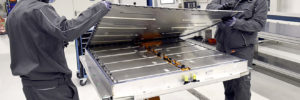Volkswagen has opened its first EV battery recycling facility to recover raw materials such as lithium, nickel, manganese and cobalt in a closed loop, together with aluminum, copper and plastics, achieving a recycling rate of more than 90% over the long term.
The unique feature of the plant in Salzgitter, Germany is that it only recycles batteries that can no longer be used for other purposes. Before the battery is recycled, an analysis determines whether it is still powerful enough to be given a second life in mobile energy storage systems. Larger volumes of battery returns are not expected until the late 2020s at the earliest. Therefore, the plant has been designed to initially recycle up to 3,600 battery systems per year during the pilot phase—the equivalent of more than 1,600 tons. In the future, the system can be scaled up to handle larger quantities as the process is optimized.
The recycling process does not require energy-intensive melting in a blast furnace. The used battery systems are delivered, deep-discharged and dismantled. The individual parts are ground into granules in the shredder and then dried. In addition to aluminum, copper and plastics, the process also yields valuable “black powder,” which contains the important raw materials for batteries such as lithium, nickel, manganese, cobalt and graphite. The separation and processing of the individual substances by hydrometallurgical processes—using water and chemical agents—is subsequently carried out by specialized partners.
“Essential components of old battery cells can be used to produce new cathode material,” explained Department Head Mark Möller. “From research, we know that recycled battery raw materials are just as efficient as new ones. In the future, we intend to support our battery cell production with the material we recover. Given that the demand for batteries and the corresponding raw materials will increase drastically, we can put every gram of recycled material to good use.”
Source: Volkswagen
Source: Electric Vehicles Magazine


